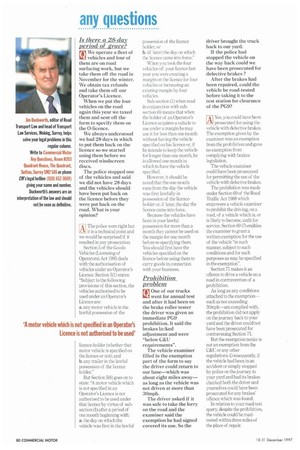Prohibition problem
Page 82

If you've noticed an error in this article please click here to report it so we can fix it.
One of our trucks
went for annual test and after it had been on the brake roller tester the driver was given an immediate PG9 prohibition. It said the brakes lacked adjustment and were "below C&U requirements".
The vehicle examiner filled in the exemption part of the form to say the driver could return to our base—which was about eight miles away— as long as the vehicle was not driven at more than 30mph.
The driver asked if it was safe to take the lorry on the road and the examiner said the exemption he had signed covered its use. So the driver brought the truck back to our yard.
If the police had stopped the vehicle on the way back could we have been prosecuted for defective brakes ?
After the brakes had been repaired, could the vehicle be road-tested before taking it to the test station for clearance of the PG9?
A Yes, you could have been
prosecuted for using the vehicle with defective brakes. The exemption given by the examiner was an exemption from the prohibition and gave no exemption from complying with brakes legislation.
The vehicle examiner could have been prosecuted for permitting the use of the vehicle with defective brakes.
The prohibition was made under Section 69 of the Road Traffic Act 1988 which empowers a vehicle examiner to prohibit the driving, on a road, of a vehicle which is, or is likely to become, unfit for service. Section 69(7) enables the examiner to grant a written exemption for the use of the vehicle "in such manner, subject to such conditions and for such purposes as may be specified in the exemption".
Section 71 makes it an offence to drive a vehicle on a road in contravention of a prohibition.
As long as any conditions attached to the exemption-such as not exceeding 30mph—are complied with, the prohibition did not apply on the journey back to your yard and the driver could not have been prosecuted for contravening Section 71.
But the exemption notice is not an exemption from the C&L.: or any other regulations. Consequently, if the vehicle had been in an accident or simply stopped by police on the journey to your yard and had its brakes checked both the driver and yourselves could have been prosecuted for any brakes' offence which was found.
In relation to your road-test query, despite the prohibition, the vehicle could be roadtested within three miles of the place of repair.












































































































































